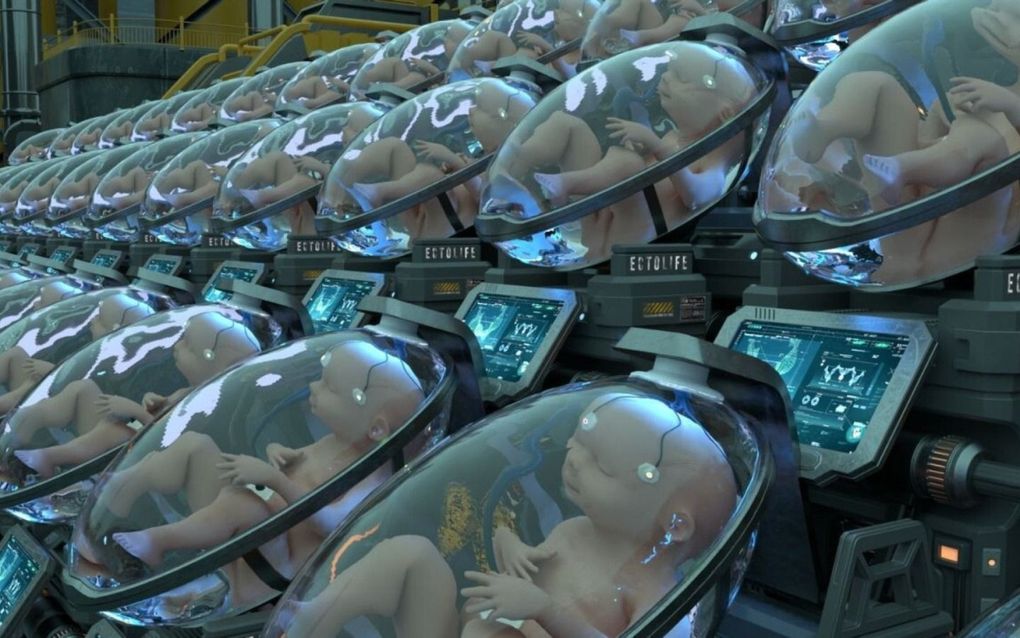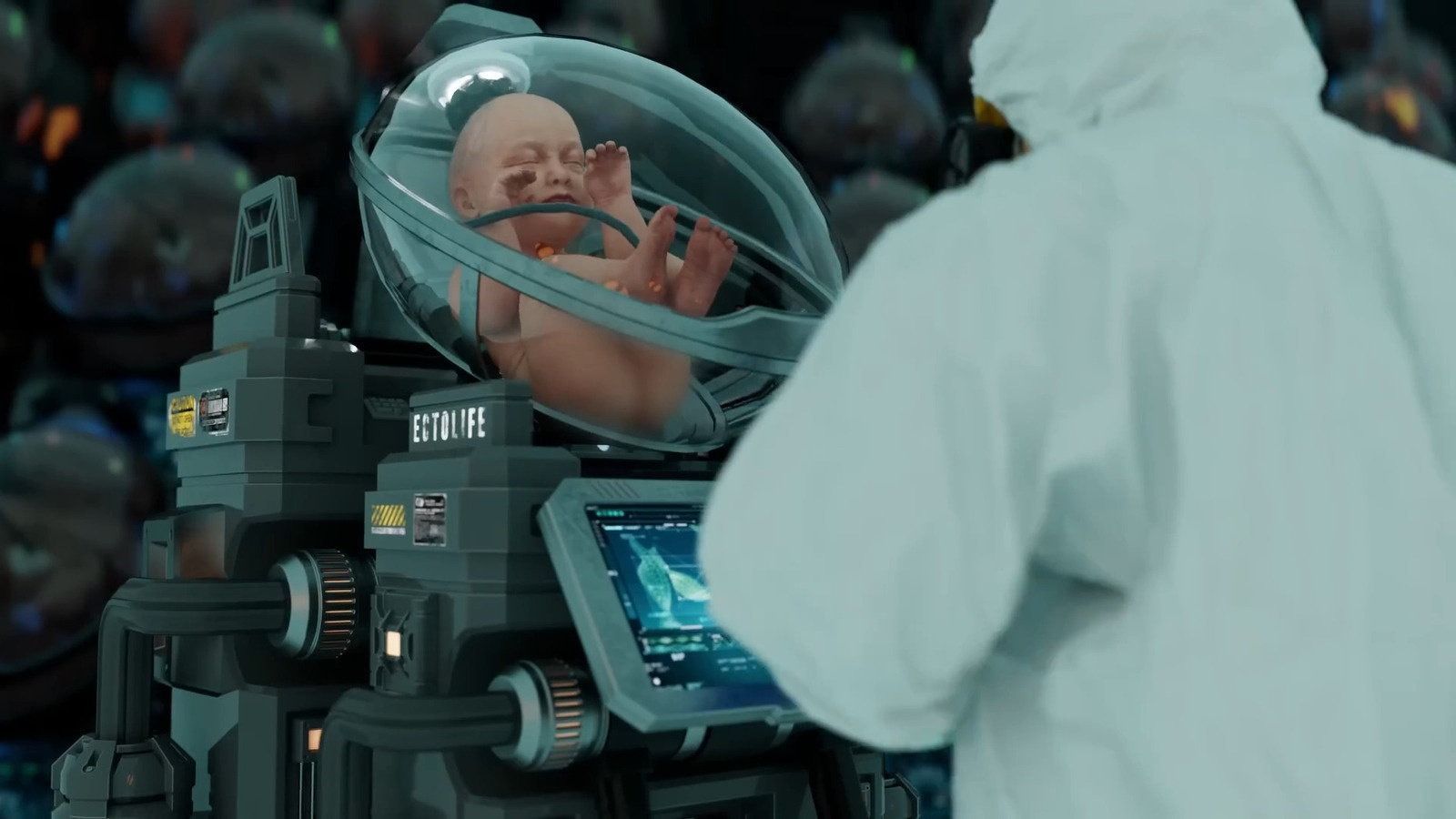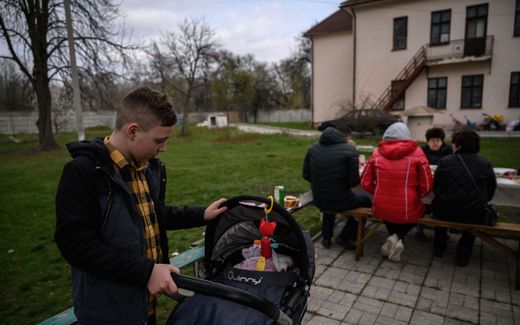Future mother could be a machine
02-01-2023
Central Europe
Bart van den Dikkenberg, RD

Photo EctoLife, Hashem-Al-Ghaili
Central Europe
Is being born to a human mother really the best thing for a mother and child? Berlin filmmaker Hashem Al-Ghaili does not believe so. As far as he is concerned, children will soon come from a baby hatchery. How are his ambitions going?
Babies can grow up in transparent growth capsules, Al-Ghaili believes. He foresees his baby hatchery having 75 labs, each with 400 capsules. Such a hatchery could give birth to some 30,000 children every year.
Al-Ghaili's plans are eerily similar to the hatching and breeding facility described by British author Aldous Huxley in his book "Brave New World" (1932). But those who think they have stumbled into a science fiction story, may be shocked.
"It seems probable, however, that we are only several years away from testing on human subjects," British ethicist Elizabeth Chloe Romanis wrote back in 2018. Carlo Bulletti, associate professor of reproductive sciences at Yale University (US), expected that same year the first fully functioning artificial womb "within a decade". So it could be as soon as five years from now.

The baby-rearing company EctoLife now exists only as Al-Ghaili's thought experiment. But the state of science is hardly an obstacle anymore. Technically, the ideal conditions for a baby can be mimicked in a transparent artificial womb, EctoLife's EZ Womb. After all, back in 2017, scientists managed to grow a lamb in an artificial womb.
If EctoLife can pull it off, how will such a womb work? A lot depends on the artificially intelligent electronics that will monitor the baby in the EZ Womb. For instance, the temperature must not fluctuate too much, and the fluid is constantly refreshed with exactly the right amounts of hormones, antibodies and growth factors. An artificial umbilical cord supplies oxygen and nutrition. A bioreactor converts waste products into new nutrients. Speakers allow the child to get used to the parents' voices and soothing classical music. Meanwhile, the child floats in synthetic amniotic fluid, with an unobstructed view of the other babies.
First kicks
To let expectant parents build a bond with their baby in advance, they can closely follow their project at home on the couch via an app on their smartphone. Those who want to empathise with the child can do so with a virtual reality headset. A timelapse video of the nine-month rearing period is also among the options. Women who miss the first kicks can don a haptic suit that makes the kicks feel lifelike whenever they want. And for those who find all that too distant, there is the option of installing the artificial womb in the living room. Then the whole family can watch the sibling grow.
Although Al-Ghaili has no concrete plans to build EctoLife yet, he says this is all perfectly possible based on current knowledge. For now, the filmmaker wants to start the conversation about it. He says that machine-made baby rearing could be very common within a few decades. Starting with people who cannot have children naturally (anymore).
"It is a perfect solution for women whose uterus has been surgically removed because of cancer or other complications. It could also help solve problems arising from low sperm count," Al-Ghaili told the popular science magazine Science and Stuff. According to him, EctoLife could make "miscarriage ultimately a thing of the past".
Parasite
But why would anyone want to touch their child so impersonally, coldly and unnaturally? Al-Ghaili argues that pregnancy is no fun at all for most women. They are often tired and nauseous, and they feel pain. Sometimes pregnancy is even dangerous for mother and child. Every year, about 300,000 women die shortly after pregnancy due to complications.

According to the filmmaker, the benefits speak for themselves. From the very first day after 'birth', parents can prepare freshly for parenting "instead of being gradually emaciated by a parasitic organism".
After nine months, human babies come into the world rather helplessly. They are not fully developed after then. But in the wild, newborn animals can already walk almost immediately. Al-Ghaili wonders why babies cannot just crawl out of the womb and walk on two legs five minutes later. With a Womb EZ, that problem can also be solved. Babies might be able to climb out on their own after spending a year and a half or even longer in the artificial womb.
Eliminated
With his plans, Al-Ghaili aligns seamlessly with the technophilic pronatalism of Tesla boss Elon Musk and others. This movement calls it worrying that the birth rate of Western countries is declining and advocates generating lots of offspring. To sustain a population, each woman must give birth to an average of 2.1 children. Most western countries are far below that.
A tweet by tech investor Sahil Lavingia got Al-Ghaili thinking: "We should invest in technology that makes having children much faster/easier/cheaper/accessible. Synthetic wombs, etc." The filmmaker wants to capitalise on this with EctoLife.
For technology, it does not matter what family form the child has to grow up in, whether traditional, alternative or experimental. Test tube fertilisation, genetic screening, selection of "genetically superior embryos", and genetic modifications with the Crispr-Cas technique are also possible. Physical defects or other abnormalities can be detected early and eliminated or remedied.
Money is not a barrier to implementing initiatives like EctoLife. The reproductive sector is expected to reach a turnover of roughly €55 billion by 2028.
Al-Ghaili suspects that "we are only a few years away from creating a fully functional EctoLife growth capsule. Other features such as the haptic suit, virtual reality, app connectivity and an artificially intelligent monitoring system are already in daily use. So, yes. In many ways, perhaps, we’re almost there." The science fiction scenario of "Brave New World" has now become a matter of time and money.
Christian ethicist highly critical
Theo Boer, a Dutch professor of healthcare ethics at the Protestant Theological University in the Dutch city of Groningen, is highly critical of raising babies in an artificial womb.
What ethical concerns do you have about this?
"There are quite a few. There will have to be lengthy and expensive research into the safety of the technique, first with animals, and later with children. The first children to be raised in artificial wombs will be test subjects in a highly invasive and risky experiment. In light of current guidelines, these are hardly ethically justifiable.

The importance of a personal, emotional, physical and existential bond between mother and child before birth has been amply demonstrated. I fear serious psychological damage to those children. Will they still feel secure with others?
These technologies are yet another signal that specifically the female is not needed at all. I can't imagine how this serves the emancipation of women."
What is the consequence of such technologies?
"They are another move away from nature. Natural boundaries and limitations are becoming more and more out of the picture. Sexuality and procreation are taken further apart. Having children becomes even more of a project."
So who benefits from this?
"Perhaps women who are too old to bear children? But then maybe they should not have children at all given their age at parenting. Women who don't have a womb? That's a tiny group. For two men who want a child? That, too, is undervaluing women. For women who don't have time for pregnancy because of their careers? But will they have time to raise their child?"
Other controversial techniques, such as test tube fertilisation, genetic screening, embryo selection and genetic engineering, accompany this breeding technique. To what extent are there still objections to these?
"I think there are fairly broad objections to this among ordinary Dutch people. But experience shows that they do disappear within a few decades of massaging. For example, people will say, "I'm not in favour of it myself, but if others want it so much, who am I to be against it?" Relatively rare, wretched examples are used to remove social resistance. And when people say that this technique will involve selection on "genetically superior embryos" and genetic modification with Crispr/Cas technology, the answer will be that there will be an ethical review that makes that impossible. But experience shows that boundaries will shift."
What Biblical objections would you raise?
"No specific ones. The Bible does not have these techniques. My arguments are mainly from considerations that any critical person will agree with. The most important thing the Bible teaches me is this: don't adapt to the spirit of the times. Let your no be no. Christians have nothing to do with artificial human mothers."
To what extent is current legislation still a barrier to this technique?
"The law requires the recognition of a child at least the mother who gave birth to the child, plus a father who recognises it. Perhaps, for the time being, the child born from an artificial womb will count as a foundling that can be adopted."
This article was translated by CNE.news and previously published in Dutch daily Reformatorisch Dagblad on December 30th, 2022.
Related Articles





